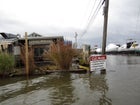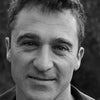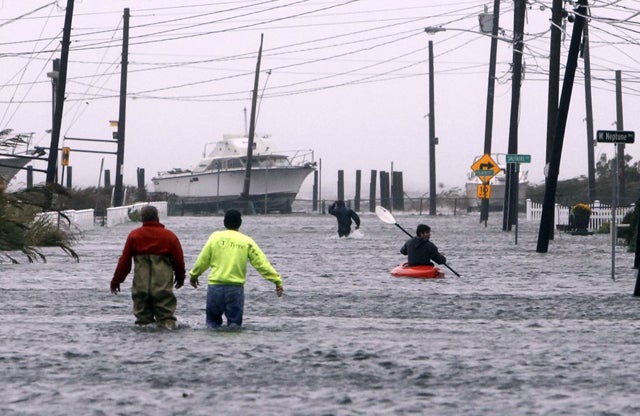Men in hoodies splashed through knee-deep water in galoshes, shouting, trying to start a chainsaw. They worked at DeGarmo’s Boat Yard in Babylon, New York, on the south shore of Long Island. The yard was a wreckage heap of hulls and masts, boats on top of boats. The men were trying to get a swamped, broken dock out of the way—probably it had washed into the yard from somewhere else—so they could begin to salvage their destroyed boats.
 The Cull House.
The Cull House.It was Wednesday afternoon, two days after Hurricane Sandy made landfall, and I was driving around the south shore near Babylon, which took a buffered only by Fire Island, where journalists are not yet allowed and where recovery efforts are still underway. My guide, Chris Padden, a Long Island wilderness search-and-rescue team leader, leaned out of his Ford F-150. “You guys need a chainsaw? I got a chainsaw.”
“This guy’s got a chainsaw!”
Padden, who is 39 and has a military-style buzz cut, hopped out, threw on camouflage waders, grabbed the chainsaw, and sloshed through shin-deep water to hack up the dock. I watched, as did 20 or so marina employees around me. I had my tape recorder and notebook with me, and, feeling a sense of obligation to my job, I asked a tall man standing near me what his name was.
“What’s this for?” he asked.
“I’m with ���ϳԹ��� magazine,” I replied.
He looked down. “I don’t, I don’t want to—”
“I’m so sorry,” I said and went back to Padden’s truck, where I ditched my notebook and recorder. We heard sirens; a fire-department chief rolled up in a new SUV. Crew cut, tan. I approached another of the dockworkers and offered to help. “There’s nothing to do,” he said. “We’re getting shut down.” The fire department soon arrived in full. There was a gas leak in a nearby house, and the DeGarmo’s guys were ordered to stop their salvage mission. Padden’s saw went silent; he’d finished cutting up the broken dock, but no one would be getting to the boats anytime soon. Another dockworker, who looked to be in his forties, sloshed through the water in rubber boots. I asked if he was doing OK. He didn’t turn to meet my eye.
“Trying like hell,” he said.
Padden and I left. An obese firefighter wearing a Planet Fitness T-shirt directed us away from the scene, and we drove north, inland. Within minutes we were in a bustling area of strip malls and retail stores.
IN THE POST-SANDY recovery, these juxtapositions are truly alarming. Downtown Brooklyn is alive and happening; Coney Island, seven miles away, is a set from The Day After Tomorrow. North of Montauk Highway, which runs west-to-east on Long Island, it’s business as usual—bagel shops, blue skies, box stores—only with less gas, dark traffic lights, and more kids on the street, since schools are closed. South of Montauk, where numerous canals and inlets divvy the shore up into miniature peninsulas, trees lie on power lines, boats sit askew in yards, and the National Guard stands watch. On Wednesday, in many places, standing water still surrounded houses.
Padden and I had spent the morning driving around, looking for someone to help. He occasionally made apologies for the lack of action and was clearly frustrated that he had no official role in the recovery. He’s a career rescue worker—a fireman, hunter, and skier who grew up on Long Island—and he has two master’s certificates, one in homeland security and one in emergency management. Immediately after the storm, I’d called the offices of emergency management in Nassau and Suffolk counties, which would be coordinating rescue and recovery efforts in the area, to see if I could join a team. They were busy, and I didn’t hear back, so I called Padden, who runs . I’d heard that he arrived on Long Island with an Everest-grade tent, fishing waders, a spare tank of gas, and enough energy bars for a week. He met me in a strip mall in his home town of Medford. The power was on, and the bagel shop was open and busy.
“You ready for an interesting day?” he asked. At first it wasn’t so interesting. Padden drove around, snapping photos of downed trees. He’s been a volunteer with two fire departments, but he isn’t affiliated with one now, focusing instead on the 15-person search-and-rescue team he leads. Firefighter buddies of his had spent the first day of the storm pulling people out of flooded homes. He’d spent the day after it had passed clearing fallen brush to help emergency vehicles get through, but not in any official capacity. His phone wasn’t ringing.
“Out here we have so many resources, and we’re not all being used,” he said. “It’s a little-fish, small-pond kind of thing.”
We swung through the town of Mastic Beach, a working-class neighborhood that had been torn up by Sandy. Trees and power lines were down everywhere. I asked if any of the lines were live; Padden said they weren’t. I’d read that between 60 and 70 percent of Long Island is without power; some of the substations on the south shore had been damaged by seawater, and according to , it would take more than 10 days for power to return in some areas. (The Long Island Power Authority’s media-information line was busy when I called.)
We came to an area near the ocean where the road was still full of water. At one home, men in Jets sweatshirts were sifting through the rubble that used to be their garage. The air smelled like oil, and there was a sheen on the water, the result of busted or flooded fuel tanks. Padden asked if the guys were OK. They stared back blankly.
“I’m looking for tree stuff,” Padden said. If there was a tree he could take out with a chainsaw, he would be happy to do so. Putting the floodwater back in the ocean was a trickier job.
We moved on to Center Moriches, just a few miles west. Padden thought the damage there would be horrific, because there’s a natural channel through Fire Island just across the bay. But the houses, which looked more upscale than those in Mastic, seemed fine.
“I don’t want to say that the storm knew class lines,” Padden said, “but man….”
In the distance, Coast Guard helicopters buzzed over Fire Island.
We headed west, to Sayville. Padden wanted to check on an acquaintance who owns a water-side restaurant called the Cull House, a hangout for members of his search-and-rescue team. The Cull House sits on a shorefront road abutting a boatyard. The boats had been knocked off their stands; the road was still underwater. Padden drove through, the water halfway up his wheels. Two men stood at the edge of the standing water, looking at the Cull House, which was swamped.
“Seen John?” Padden asked. They shook their heads. Directly behind them, a small one-story house displayed a sign that read “For Sale: $405,000.” Around here, the first stories of houses had all filled with seawater.
We went to the West Islip fire department, to see a firefighter buddy of Padden’s named Josh. Josh looked tired. He was about five-seven, with a thin build and a crew cut. He’d worked the first 24 hours after Sandy hit straight through, and his department had answered about 40 calls since the storm.
“What’s goin’ on?” he asked Padden.
“We’re sitting around doing nothing, waiting for someone to say, Hey, you exist! Let’s use you!” said Padden. “What’s going on here?”
“Things are kind of going back to normal,” Josh said. “Now we’re responding to alarms that we’re dispatched to. During the storm, it was people calling the firehouse directly, saying, Help, come get me. That part is over. Now it’s storm-related calls, automatic alarms, power coming back on tripping the autos, wires down.”
Josh wanted to know if there was any access to Fire Island. “I wonder if you can get down the Moses,” he said. “I heard the causeway—that’s pretty remarkable stuff down there.”
“No, it’s shut south of Merritt Road and Robert Moses,” said Padden.
“I saw pictures yesterday—you know where the monument is down there and there’s another traffic circle? The ocean took out the dunes and came right up the road. That’s where I heard the drama is now, on Fire Island.”
A call came in, a 23—a non-fire-related incident. Josh had to go. “Go bounce around south of Montauk Highway,” he said. “It’s all open.”
NOT FAR FROM DEGARMO’S, we turned into another road on another canal. More standing water, more displaced boats near the canal. Two men and a young woman stood in a yard, discussing looters. One of the men wore Army fatigues. He smoked a cigarette nervously and paced. “You guys OK?” asked Padden.
“We got people breaking into houses,” said the guy in fatigues. “I hope they come back. It’s been a while since I shot somebody.” The young woman, who had a round, pretty face and dark hair, said there were something like 50 guns in her house.
“You really have looters?” I asked.
“There are footprints in my neighbor’s window,” said the man in fatigues. He’d been called to duty on Monday, the day after Sandy arrived—he didn’t say where—but was promising to stay home the next day. “I don’t care,” he said. “If they wanna give me an Article 15”—a minor punishment—“or not pay me, I’m staying. I got people breaking into houses.”
We drove a few blocks away from the water, and things returned to normal: kids skipping down the street, getting ready for Halloween. “In some of these places, it’s like nothing happened at all,” said Padden.
Soon we were back on the Montauk, heading west. The Jersey shore and Long Island form an elbow. Sandy arrived from the southeast, hitting Atlantic City and the Jersey barrier islands first, then plowing up the coast. Long Island’s upscale east end—Montauk and the Hamptons—was spared the brunt of the hurricane’s force. That’s not to say that everything’s fine there: West Hampton beach was torn up. But on the south shore, the farther west you go, the worse the damage is. Drive west on Montauk Highway, find a canal, turn left, behold the wreckage: trees on power lines, houses surrounded by water, people sweeping porches with blank stares on their faces, a beautiful stone manor house with three yachts perched on the lawn.
The highway got more busy in West Babylon and Lindenhurst. This was because of the large National Guard presence. At South Wellwood Avenue, just between West Babylon and Lindenhurst, a Humvee was set up as a roadblock, preventing anyone but residents from turning south. Padden turned south.
“Lindenhurst residence ID?” asked a soldier in fatigues and a helmet.
“Going to headquarters, just want to loop around,” Padden said. The soldier looked at the huge “Search and Rescue” sign on the Ford and waved us through. “Talk your way into anything,” Padden said.
We drove down yet another canal, where we saw a motorboat in an impossible pose: nose submerged, aft in the air, propped up by its outboard motor, which sat on a dock piling. We drove slowly through the neighborhood. It was a shambles. There were policemen sawing up downed trees, and water was a constant, just everywhere, surrounding porches, in roads, swallowing power lines.
The people here looked to be moving slowly or not at all, which is what you do when the shock and adrenaline have worn off but the water’s still there and you can’t do much but wait. I said something about how Padden should do what he needed to do and help if he wanted.
“I’m looking for tree stuff,” he said. “For the most part, these people, they’re going to take care of their own.” What Padden could do was remove trees and ask people if they were OK. Every time he asked, they said yes, and we moved on.
FIVE MORE MINUTES DOWN the highway, we turned left yet again, at yet another canal. More boats on lawns. There was no National Guard around. “This doesn’t make sense,” Padden said. “Why’s there so much presence there? If you’ve got 10 guys and one officer, take seven blocks and put one guy on each block, with an officer in charge of those seven. Why are they all in West Babylon?”
At the end of the canal was another roadblock: a mid-’90s minivan parked sideways. In front of it sat two men, Larry and his buddy. Larry was fit, in a purple T-shirt and a Broncos hat, smoking a cigar. His buddy wore jeans and a denim jacket with a “Wounded Veteran Purple Heart” patch on it. Padden pulled over and walked up.
“You guys all good?” he asked.
“Yep,” said Larry in a raspy voice. Beyond him, at the end of the road, right up against the ocean, was a pile of wood: a condemned house that Sandy had disposed of. Padden asked about the house. Larry mentioned that boats around here had floated for up to three blocks.
“I got a new one in my yard,” said his friend.
Padden said something about the heavy security presence in West Babylon.
“I don’t get why they’re not here,” Larry said. “We’re not a fucking sideshow.”
A sleek black Mercedes approached. Larry hopped up and walked to the car: “You live here?” The driver said no. Larry just shook his head and walked away.
“Trying to see how the other half lives,” Padden said. He gave Larry his card and told him to call if he needed anything chainsawed, and we drove away. “You gotta wonder what they’ve got in that van to protect the area,” Padden said. We drove back inland to Medford.
Padden was beat. He had to pick up his daughter, the next day was the opener of duck season, and he wanted to see if he could get out to clear his head. He was tired of sitting around waiting for someone to call. He dropped me at my car, and I threw my waders back in, ordered a sandwich from the bagel shop, and said good-bye. I drove back down to the south shore to try and find Larry and his buddy, but after three or four or five wrong turns in the maze of roads on the canals west of Lindenhurst, it got dark. It was time to get back to Brooklyn, where the bars were full of costumed revelers. On the radio, Mayor Bloomberg announced that the Halloween parade was canceled but that the marathon would be run on Sunday, officials stated that limited subway service would soon begin, and reporters warned of mile-long lines at gas stations and the worst day of gridlock in the history of New York City. Representatives of Allstate and Geico made promises during the commercials. New Jersey governor Chris Christie said flatly that the Jersey shore of his youth was gone. A CBS news-radio reporter visited with a man who had lost his home in Breezy Point, Queens, site of a huge fire that consumed some 80 houses and drew much of the press in the days following the hurricane.
Compared with places like that, the south shore wasn’t hit hard. And still, the kind of wreckage that’s down in Lindenhurst doesn’t take weeks and months to repair. It takes years. And it takes electricity, clean water, and gasoline. I drove west in fits and bursts with the surging, lawless traffic on the highway, thinking about how Larry would fare, wondering what the hell was going on out on Fire Island, and looking for gas.


